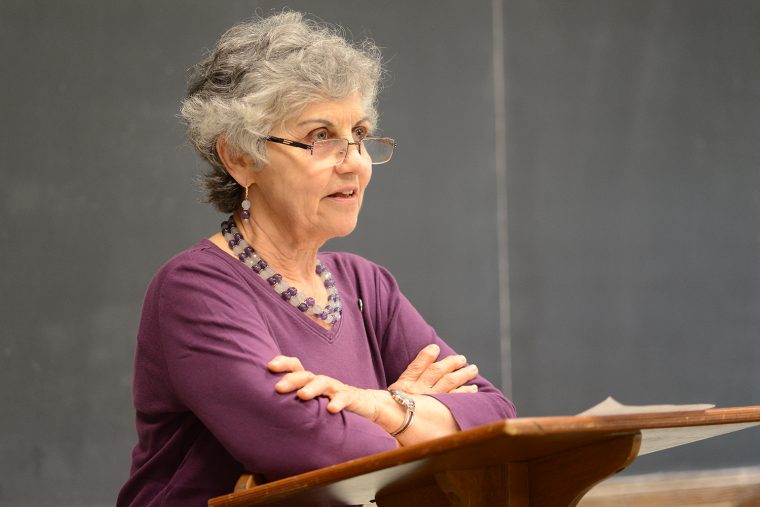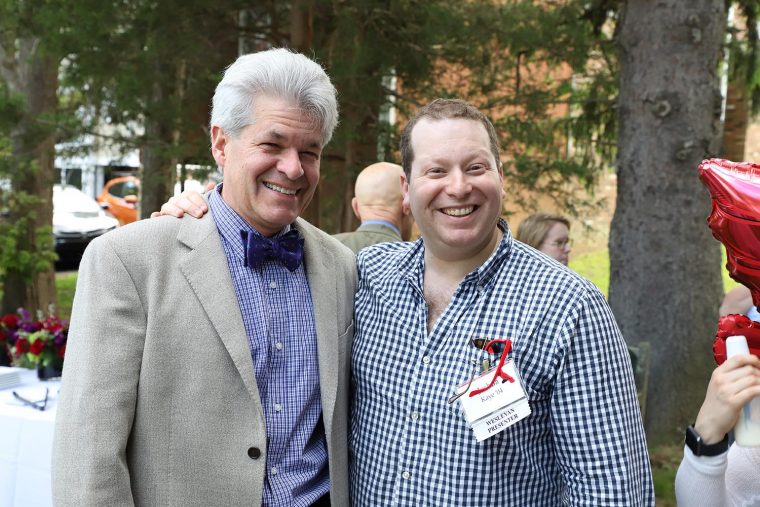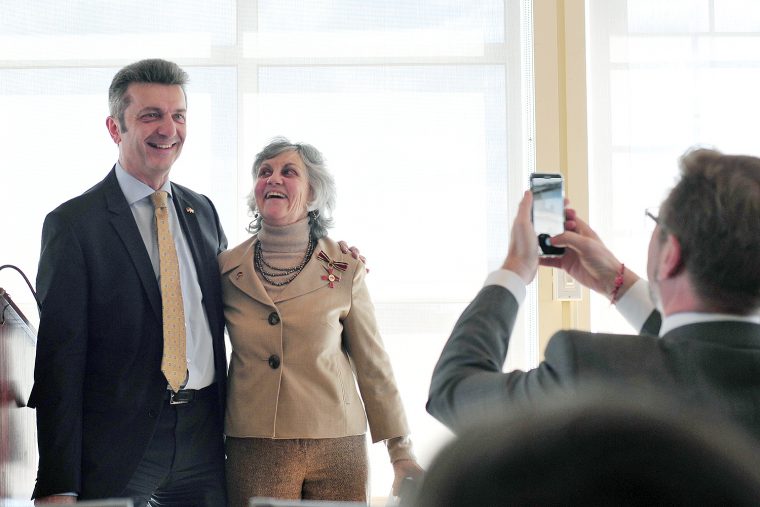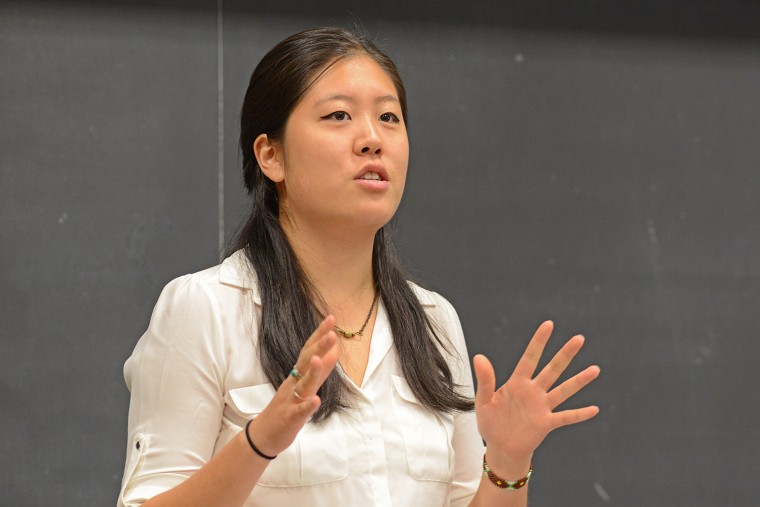In July, three faculty will begin new appointments at Wesleyan. Katja Kolcio will succeed Peter Rutland as director of the Allbritton Center for the Study of Public Life; Stephanie Weiner will succeed Sean McCann as director of the Shapiro Center for Writing; and Krishna Winston will succeed David Beveridge and Alex Dupuy as director of the Wasch Center for Retired Faculty. Katja Kolcio, associate professor of dance, received certificates from Free Ukrainian University and from Kyiv Institute of Art and Culture; and her PhD from The Ohio State University. Her work specializes in the role of creative physical engagement in…
Krishna Winston, Marcus L. Taft Professor of German Language and Literature, Emerita, recently translated four film narratives by German screenwriter and author Werner Herzog. The collection, titled Scenarios III, was published by the University of Minnesota Press in 2019. It presents the shape-shifting scripts for Herzog’s early films: Stroszek; Nosferatu, Phantom of the Night; Where the Green Ants Dream; and Cobra Verde. Scenarios III completes the picture of Herzog’s earliest work, affording a view of the filmmaker mastering his craft, well on his way to becoming one of the most original, and most celebrated, artists in his field. Winston also translated Herzog's Signs…
The American Association of Teachers of German (AATG) recently named Krishna Winston, Marcus L. Taft Professor of German Language and Literature, Emerita, an honorary fellow of the association. The fellowship is limited to 25 fellows worldwide. Founded in 1926, the AATG has nearly 3,500 members and "believes that bringing the language, literature, and cultures of the German speaking-world to all Americans is a vital humanistic endeavor, which serves an essential national interest," according to its website. To receive this honor, Winston was nominated by 10 colleagues, with the nomination approved by the Honorary Fellows Committee and voted on by the…
For the second time, an author whose work Krishna Winston, the Marcus L. Taft Professor of German Language and Literature, Emerita, translated, has won the Nobel Prize in Literature. The 2019 Nobel Prize in Literature was awarded to Austrian author Peter Handke on October 10 "for an influential work that with linguistic ingenuity has explored the periphery and the specificity of human experience," according to the Nobel committee. Handke has become "one of the most influential writers in Europe after the Second World War," the committee said. Winston, who specializes in literary translation, began translating Handke after his long-time English…
In 2018–19, six Wesleyan faculty retired from Wesleyan. They were honored during the 187th Commencement ceremony on May 26 and during a special ceremony at the Wasch Center for Retired Faculty. The faculty include: Douglas Charles Professor of Anthropology (2000 – 2019) Associate Professor of Anthropology (1994 – 2000) Assistant Professor of Anthropology (1986 – 1994) Ronald Ebrecht University Organist (1988 – 2019) Artist-in-Residence, Music (2011 – 2019) Laura Grabel Lauren B. Dachs Professor of Science and Society (2008 – 2018) Fisk Professor of Natural Sciences (1996 – 2008) Professor of Biology (1995 – 2018) Associate Professor of Biology (1989…
Krishna Winston, the Marcus L. Taft Professor of German Language and Literature, professor of environmental studies, received a lifetime achievement award from the German government on Feb. 13. Ralf Horlemann, the Consul General of Germany to New England, bestowed the Order of Merit of the Federal Republic of Germany on Winston after a ceremony held in Allbritton Hall. The Order of Merit is the highest tribute the Federal Republic of Germany pays to individuals for services to the nation or contributions to enhancing Germany’s standing abroad and its relations with other countries. Winston received the award for her scholarly and…
Krishna Winston, the Marcus L. Taft Professor of German Language and Literature, translated The Moravian Night: A Story by German novelist Peter Handke. The American translation was published in December 2016 by Farrar, Straus and Giroux, New York. Reviews of the translation have appeared in The New York Times, the New York Review of Books, and Kirkus. Winston specializes in literary translation and has translated more than 35 works of fiction and non-fiction from Handke, Johann Wolfgang von Goethe, Günter Grass, Christoph Hein, Golo Mann, Rainer Werner Fassbinder and Hans Jonas. Her translations make available to the entire English-speaking world works originally written…
Eleven Mellon Mays Undergraduate Fellows delivered brief research proposal presentations July 23 in Fisk Hall. The fellows, six from Wesleyan and five from Queens College, City University of New York, spent the past two months developing their research projects with the assistance of their peers, Wesleyan faculty and Wesleyan librarians.
The Mellon Mays Undergraduate Fellowship Program provides minority students and others with a demonstrated commitment to eradicating racial disparities, with support to pursue graduate degrees in the arts and sciences.
Research topics range from deconstructing African feminism to the role of political theater for a post-combat audience to trauma in Japan caused by the Atomic Bomb.
When the Nobel Prize-winning German writer Günter Grass died at age 87 this week, The Wall Street Journal turned to Krishna Winston, his translator, for perspective on his life. According to the Journal's obituary, Grass was Germany's best-known contemporary writer "who explored the country's postwar guilt and in 2006 admitted to serving in one of the Nazis' most notorious Nazi military units." Winston remembered Grass as "a gregarious man who loved cooking and invited his children to sit in on meetings with translators that often lasted several days..." (more…)
Krishna Winston, the Marcus L. Taft Professor of German Language and Literature, is the translator of Patrick Roth's Starlight Terrace, published by Seagull Books in 2012. In a rundown Los Angeles apartment building—the titular Starlite Terrace—Roth unfurls the tragic linked stories of Rex, Moss, Gary and June, four neighbors, in a sort of burlesque of the Hollywood modern. In each of their singular collisions with fame, Roth’s dark prose presages a universal and mythical fate of desperation. In “The Man at Noah’s Window,” Rex shares the story of his father, a supposed hand double for Gary Cooper in High Noon. In “Eclipse…
Krishna Winston, the Marcus L. Taft Professor of German Language and Literature, will attend a translators working meeting with Günter Grass Feb. 10-14 in Lübeck, Germany. Grass, 85, is novelist, poet, playwright, artist and sculptor. He received the Nobel Prize in Literature in 1999. Winston has translated several of Grass's works, including his 1990 diary, From Germany to Germany, which was published by Houghton Mifflin Harcourt in November 2012. This will be Winston's fourth meeting with Grass and fellow translators. The group will focus the discussion on Grass's poetry, autobiographical writings and artwork. "It's a pretty special thing when translators can sit down with the author for several…
Krishna Winston, the Marcus L. Taft Professor of German Language and Literature, is the translator of Günter Grass's From Germany to Germany, published by Houghton Mifflin Harcourt in 2012. In January 1990, just months after the fall of the Berlin Wall, Günter Grass made two New Year’s resolutions: the first was to travel extensively in the newly united Germany and the second was to keep a diary, to record his impressions of a historic time. Grass takes part in public debates, writes for newspapers, makes speeches, and meets emerging politicians. He talks to German citizens on both sides, listening to their…






